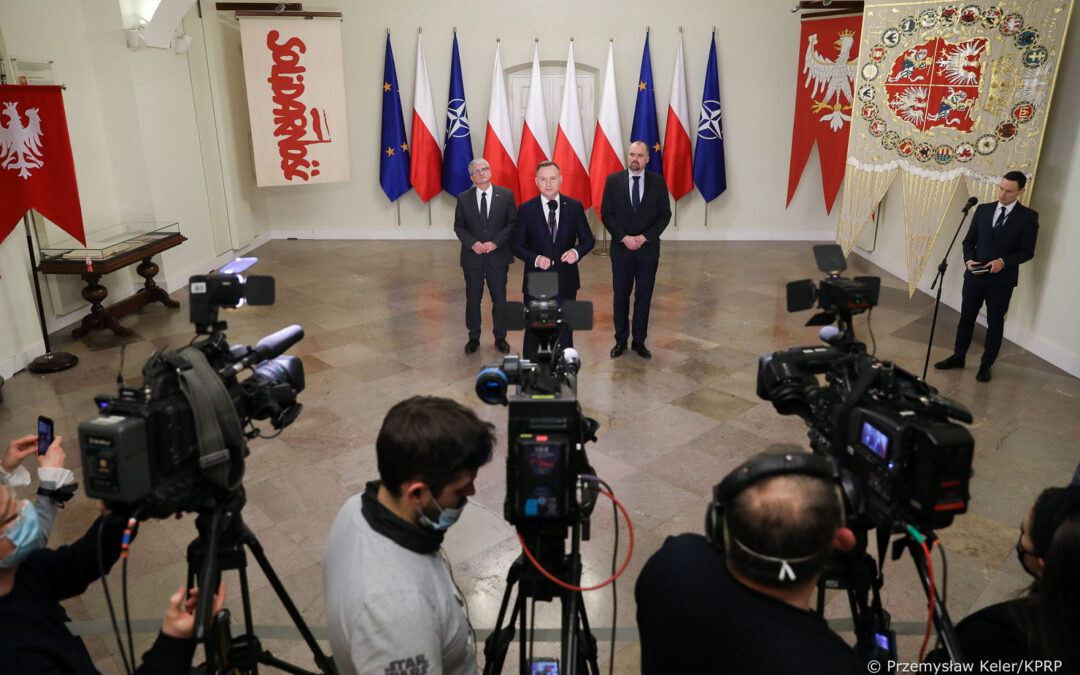Poland’s president, Andrzej Duda, has summoned the National Security Council (RBN) for a meeting on Friday to discuss the growing tensions around Ukraine. Duda stressed, however, that for now there was no immediate threat to Poland itself.
Duda’s decision comes after participating in a video call with his US counterpart Joe Biden and other European leaders concerning the heightened threat of military conflict with Russia on NATO’s eastern flank.
Prezydent @AndrzejDuda: Podczas spotkania z @POTUS rozmawialiśmy nie tylko jako OBWE, ale także państwa naszej części Europy. Dyskutowaliśmy sytuację wokół Ukrainy, ale i całej wschodniej flanki NATO. Możemy śmiało mówić o jedności Sojuszu Północnoatlantyckiego. pic.twitter.com/RNrw3xqzGK
— Kancelaria Prezydenta (@prezydentpl) January 24, 2022
The National Security Council includes the speakers of the lower and upper houses of parliament, the defence, interior and foreign ministers, leaders of political groups in parliament, as well as the heads of the security services, the president’s chancellery, and the National Security Bureau (BBN).
On Monday night, Duda said that he was convening the RBN in order to “share with the most important participants of the Polish political scene my knowledge and the picture of the situation that arises as a result of all meetings and talks that I have recently held”.
He added that the meeting would take place on Friday so as to follow consultations with Poland’s Baltic allies, expected to last until Thursday. Last week, Ukraine’s president, Volodymyr Zelensky visited the southern Polish town of Wisła for talks with Duda on the security situation.
The heads of Poland’s Roman Catholic church and the Ukrainian Greek Catholic church have jointly appealed for leaders to "refrain from hostilities" as "war is always a defeat for mankind".
They also accuse Russia of "disregarding international law" https://t.co/oQqioFAVrH
— Notes from Poland 🇵🇱 (@notesfrompoland) January 24, 2022
Duda – who as president is supreme commander of Poland’s armed forces – said that he hoped the leaders invited to the RBN meeting on Friday would discuss national security issues “responsibly”. He promised to transmit “full information on the situation as far as possible”.
Earlier on Monday, Duda had joined a discussion hosted by the White House Situation Room, which included the leaders of the US, UK, France, Germany, and Italy, as well as the heads of the European Council and Commission and NATO.
The nine attendees of the classified meeting discussed the situation on NATO’s eastern flank as well as the presence of an estimated 120,000 Russian troops in the area. Overnight, the Pentagon announced that it had set 8,500 troops on “heightened alert” in case of a Russian attack.
“There is currently no participant in the North Atlantic Alliance who would break out of solidarity with Ukraine and with the rest of the alliance,” said Duda after the call. But he stressed that “there is no indication that Poland is in any danger at this point. There is no visible danger for us”.
While the UK and US have evacuated some embassy staff and their families from Ukraine, Poland – like the EU delegation – has said that it will not do so for the time being.
Meanwhile, a new poll published today – by United Surveys for RMF FM and Dziennik Gazeta Prawna – found that 66% of people in Poland believe Poland should help Ukraine in the event of a Russian invasion. Just under 27% disagreed with helping and 7% did not state an opinion.
The most common means of support advocated by respondents were diplomatic (42.4%) and sending arms (41%), followed by economic support (38.9%) and accepting potential refugees (26.4%). Only 14.7% of respondents favoured sending Polish troops.
For more on Poland's proposed purchase of 250 Abrams M1A2 SEPv3 tanks from the US, see our article from last summer, when the deal was announced https://t.co/gC4MmVbz1E
— Notes from Poland 🇵🇱 (@notesfrompoland) January 24, 2022
Main image credit: Przemysław Keler/KPRP media materials

Maria Wilczek is deputy editor of Notes from Poland. She is a regular writer for The Times, The Economist and Al Jazeera English, and has also featured in Foreign Policy, Politico Europe, The Spectator and Gazeta Wyborcza.




















